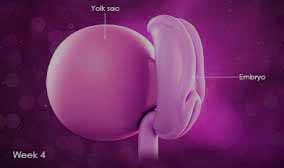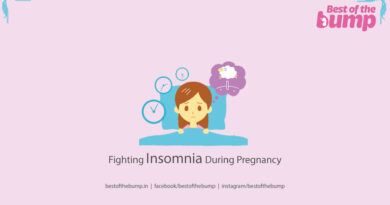Your Baby at Week 4
During week 4 of pregnancy, significant changes are occurring in the development of the baby. At this early stage, the embryo is just starting to form, and it measures around 0.1 to 0.2 millimeters in length. Let’s explore the developments taking place during this crucial time.
At week 4, the embryo undergoes implantation into the uterine lining, which marks the beginning of a complex and miraculous process. The embryo consists of three distinct layers:

- Endoderm, the inner layer
- Mesoderm, the middle layer
- Ectoderm, the outer layer
Each layer has its own unique role in shaping the baby’s organs and systems. Each layer plays a crucial role in shaping the future of your baby, giving rise to various organs, systems, and features. Join us as we delve into the intricate process of how your little one’s digestive system, heart, skin, and more begin to take form during this pivotal week. Let’s unravel the wonders of pregnancy and celebrate the miracles unfolding within you!

Endoderm, the inner layer
The innermost layer, known as the endoderm, will eventually develop into the digestive system, liver, and lungs. This layer holds the blueprint for important organs that will support the baby’s growth and sustenance once they are fully formed.
Mesoderm, the middle layer
The middle layer, called the mesoderm, plays a vital role in the development of various essential structures. It is responsible for the formation of the baby’s heart, sex organs, kidneys, bones, and muscles. The mesoderm is instrumental in laying down the foundation for the baby’s future physical capabilities and systems.
Ectoderm, the outer layer
The outermost layer, known as the ectoderm, is responsible for the development of the baby’s external features. It will give rise to the baby’s hair, eyes, skin, and the intricate nervous system. The ectoderm plays a crucial role in shaping the baby’s appearance and establishing the foundation for their sensory experiences.
While the baby is still in the early stages of development, the implantation of the embryo into the uterine lining is a significant milestone. From this point forward, the body will provide nourishment and support for the growing embryo.
During week 4, it’s essential for the expectant mother to take care of her health and well-being. This includes maintaining a balanced diet, getting regular exercise (if approved by a healthcare professional), and avoiding harmful substances such as alcohol and tobacco. Prenatal vitamins, as recommended by a healthcare provider, can help ensure that the mother and baby receive adequate nutrients for healthy development.

It’s important to note that at this early stage, many women may not yet be aware that they are pregnant. Pregnancy tests often detect the presence of the pregnancy hormone hCG (human chorionic gonadotropin) in the urine or blood, but it may take a few more days or weeks for the hormone to reach detectable levels.
If you suspect you might be pregnant or have confirmed your pregnancy, it’s crucial to schedule an appointment with a healthcare provider to begin receiving prenatal care. Early prenatal care is vital for monitoring the progress of the pregnancy, addressing any potential complications, and ensuring the health and well-being of both the mother and the developing baby.
In conclusion, week 4 of pregnancy marks a crucial period in the baby’s development as the embryo implants itself into the uterine lining. The three distinct layers – endoderm, mesoderm, and ectoderm – start to take shape, laying the foundation for the baby’s vital organs, body systems, and external features. Taking care of one’s health and seeking early prenatal care are essential steps to support a healthy pregnancy and the well-being of both the mother and baby.
Precaution during week 4 of pregnancy
During week 4 of pregnancy, it’s important to take certain precautions to ensure the health and well-being of both you and your developing baby. Here are some essential precautions to consider:
Avoid alcohol
It’s crucial to abstain from alcohol completely during pregnancy. Even small amounts of alcohol can pose risks to the baby’s development, leading to a higher chance of birth defects and developmental issues.
Quit smoking
If you smoke, now is the time to quit. Smoking during pregnancy increases the risk of complications such as premature birth, low birth weight, and respiratory problems for the baby. Seek support from healthcare professionals or smoking cessation programs to help you quit.
Take prenatal vitamins
Start taking a prenatal vitamin or a folic acid supplement as recommended by your healthcare provider. Folic acid is essential for the early development of the baby’s neural tube and can help prevent certain birth defects.
Eat a balanced diet
Focus on consuming a nutritious and well-balanced diet. Include a variety of fruits, vegetables, whole grains, lean proteins, and dairy products. Avoid raw or undercooked meats, seafood, and unpasteurized dairy products, as they may harbor harmful bacteria.
Stay hydrated
Drink plenty of water throughout the day to stay hydrated. It’s important for your overall health and supports the development of the placenta and amniotic fluid.
Practice good hygiene
Wash your hands frequently to prevent the spread of germs and reduce the risk of infections. Maintain proper food hygiene practices and avoid exposure to potentially harmful substances or chemicals.
Avoid certain medications
Consult with your healthcare provider before taking any over-the-counter or prescription medications. Some medications may not be safe during pregnancy, so it’s essential to get professional guidance.
Minimize exposure to toxins
Be cautious of your surroundings and minimize exposure to harmful substances such as pesticides, cleaning chemicals, and paint fumes. If you work in an environment with potential hazards, discuss safety precautions with your employer and healthcare provider.
Get plenty of rest
Listen to your body and ensure you get adequate rest. Fatigue is common during pregnancy, especially in the early stages, so prioritize sleep and relaxation.
Stay active
Engage in moderate exercise or physical activity unless advised otherwise by your healthcare provider. Walking, swimming, and prenatal yoga are generally safe options that can help maintain overall fitness and promote a healthy pregnancy.
Remember, every pregnancy is unique, and it’s important to consult with your healthcare provider for personalized guidance and any specific precautions or recommendations based on your individual circumstances. They will be able to provide you with the most accurate information and support throughout your pregnancy journey.




